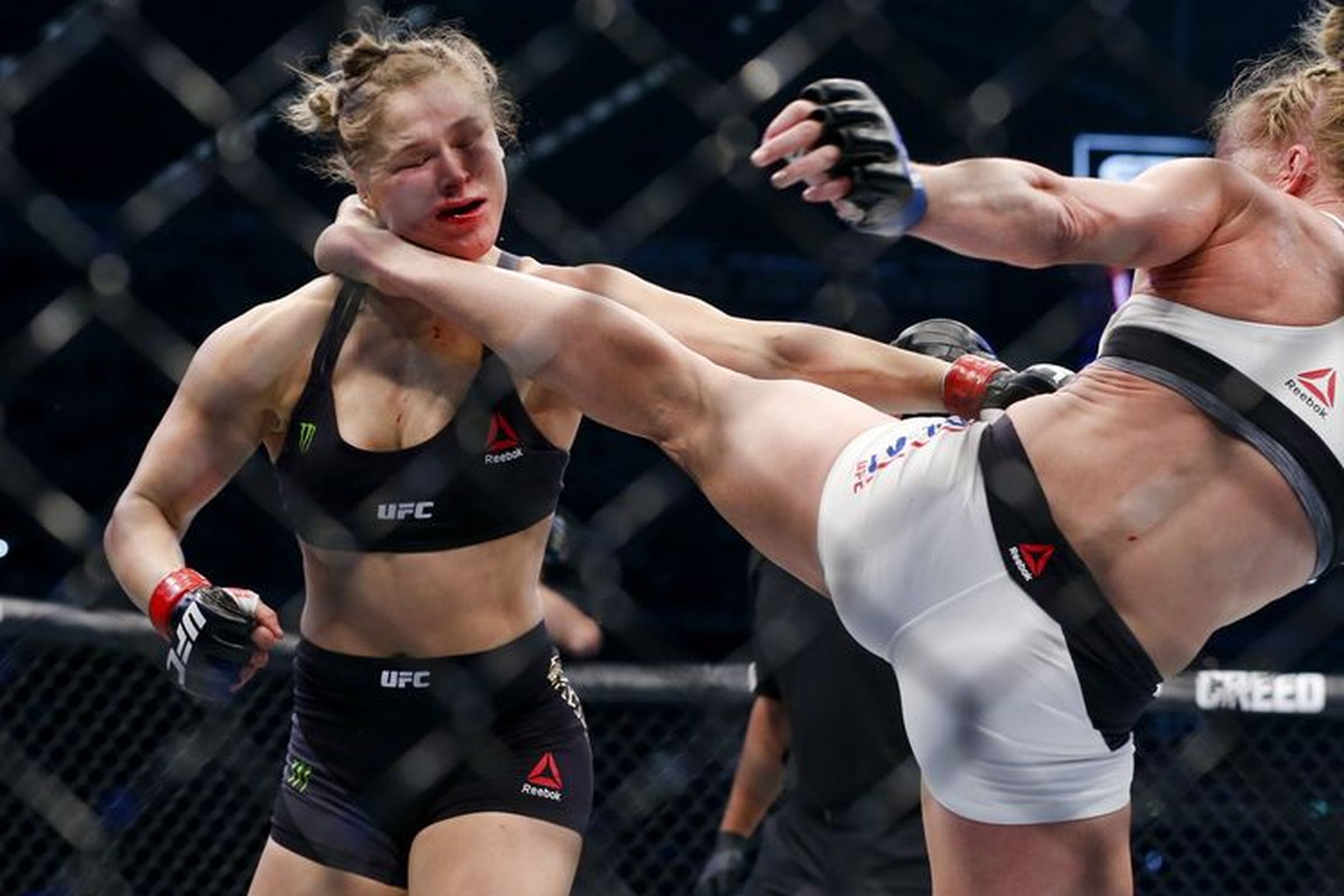Patrick Lencioni wrote a book called “Getting Naked”, which is a great story and lesson on how authenticity is extremely valuable in building authentic, trust-filled relationships with clients. I’m going to dive into what I’ve learned reading His book here.
The whole idea here is that companies and professionals are often focused on appearing invulnerable and jocky to appear as the greatest in the world. Our tendency is also that we’re hesitant to run around and add value because we’re concerned we’re giving away services for free. While this can be true, Lencioni makes a case that our businesses will flourish when we’re not afraid of being authentic, and be a little vulnerable in a reckless pursuit of the client’s interest.
Vulnerability is all about A reckless pursuit of the client’s interest.
Vulnerability, Rhonda Rousey vs. Holly Holm

Rhonda Rousey projecting invulnerability – before getting her butt kicked.
Did any of you watch and follow the Rhonda Rousey vs. Holly Holme UFC fight that took place on November 14, 2015?
I didn’t watch the fight, but social media went berserk after underdog Holly Holm knocked out the outlandish and vocal world champion Rhonda Rousey.
Now, I didn’t watch the fight live, and I’m not fully engaged in the entire world of fighting, but I was drawn into the dynamics of the fight after I heard Holly Holm talk. I immediately dove into youtube to watch every interview of both Rhonda Rousey & Holly Holm that day, because the difference in character between these two women couldn’t have been more stark.
On one hand, you had Rhonda Rousey projecting invulnerability, while on the other you had Holly Holm authentically conveying a beautiful mix of vulnerability and confidence.
During the weigh in, Rhonda Rousey raged onto the stage and immediately slammed herself into the face of Holly Holm with reckless fury to show her dominance.
Regardless of how they fought, Rhonda Rousey was primarily concerned with projecting power & invulnerability, while Holly spoke very authentically about the obstacles, challenges, and opportunities ahead of her.

Rhonda Rousey taking the crushing blow that caused her to lose the fight.
Holly Holm laid Rhonda Rousey out – and won the fight quite candidly.
Isn’t it way more embarrassing when our puffing up and talk is shown foolish by our failure?
While I’m no cage-fighter, I believe that authenticity and vulnerability are misunderstood and underutilized in business and even athletics. I want to share this because vulnerability is so vastly superior to the projection of power, that I’m confident it will transform the way you conduct sales and business.
There are two approaches of conduct in business, either projecting invulnerability & power or allowing authenticity & vulnerability. Vulnerability is far superior over it’s counterpart,
The two approaches remain starkly different in business, one relies on vulnerability and complete transparency, while the other focuses on proving its competency and protecting its reputation for intellectual prowess.
When people take the approach to avoid vulnerability in order to project invulnerability, relationships will stay fickle, low levels of trust will be built, and clients won’t be as “sticky” and loyal to us. In fact, there’s no better way to earn a person’s trust than by putting ourselves in a position of unprotected weakness, and demonstrating that we believe the client will support us.
Ironically, we live in a culture that insists that it’s critical to project strength, confidence, and poise when those are the precise things that tend to stifle our client’s ability to build trust with us. Service indsutries can have a particularly bright future if they learn to be comfortable, transparent, honest, clear, and vulnerable with their customers.
While there may be key, long term relationships where organizations should project poise, strength, and invulnerability, the majority of relationships will flourish when there’s a relentless pursuit of the client’s best interest, meaning we’re not afraid to ask “dumb questions”, confront the uncomfortable things in the room, and convey our own grappling with related problems.
Why do we resist being vulnerable with our clients? I agree with Patrick Lencioni that it’s because we become riddled with fear.
Three Fears which Stifle Vulnerability:
1 – The Fear of Losing the Business.
Business owners and service providers never want to lose out on business or revenue. Ironically, fearing the loss of business will jeopardize our ability to keep and increase business because it repels the type of traits which endear us to trust filled relationships.
Client’s ultimately want to know that we’re going to put their best interests, needs, revenue, and options ahead of our own. When we have a “failure of nerve”, in the name of protecting the revenue stream – we topple the pillars of trust we’ve built.
2 – The Fear of Being Embarrassed.
Embarrassment as a service provider is often a result of the scrutiny of our clients. We weigh every question, thought, and statement in our minds because we want to protect our intellectual pride. Ultimately, allowing our pride to get hurt shouldn’t be the result when pursuing our genuine curiosity leads to laughably wrong advice, thoughts, or questions.
Push through your fear of being embarrassed, proving to your clients that you are recklessly concerned for their own well-being.
3 – Fear of Feeling Inferior.
The pursuit of fame, honor, and our status within our sphere of influence can cause us to elevate our own importance above our clients and talk down to them. In other words, in our efforts to appeal to our need for elevated status, we forget that “servanthood” is the type of service that establishes the deepest loyalty and trust.
Understanding the three fears which stifle vulnerability allows us to recognize it in ourselves, now the next step is to shred each of the three fears.
SHREDDING THE THREE FEARS
Shredding the Fear of Losing the Business:
Stick to consulting rather then selling. Rather than being preoccupied with telling people what you would do if they hire you, simply demonstrate the value you would add by starting right then and there. This means your first meetings aren’t geared towards selling yourself as a problem solver, they should be geared to solving their problems. By adding value, you will build the strongest case for hiring your firm.
Give Away the Business don’t be afraid to start adding value right away. If you start “greasing the gears” of the client by adding value, you’re showing them who you are; without pre-occupation with contracts and revenues. That means initial consultations are a rare combination of cost-free, and helpful.
Tell the Kind Truth. It requires vulnerability to confront clients with difficult messages; particularly when the client won’t want to hear it. Failure of nerve is when you know the right thing to do, but you avoid doing it because it will cost you. This is the “reckless” part of pursuing the client’s best interests, always leaning into the issues regardless of the risk.
Enter Danger. The harder the problem to solve, the more clients will pay to have them solved. Easy problems are ones that clients can take care of themselves. Don’t shy away from big, hairy, audacious goals or tremendously scary problems.
Shredding the Fear of Being Embarrassed
Ask dumb Questions. When you ask the questions that all other folks are too afraid to ask, you’ve placed the client’s interests first. This requires vulnerability because you’ll the rest of the folks will sit there pretending that they are completely wise.
Make dumb suggestions. Do you only make suggestions when you’ve eliminated 100% doubt so that you never risk being embarrassed? Remember that your great idea is what will embed itself in the client’s memory, not the mediocre ones. Opportunities are missed when the only advice you’ll give is that which your 100% certain can never be wrong.
Celebrate your mistakes. Being wrong is inevitable, hiding or downplaying those errors is an attempt to avoid embarrassment isn’t helpful. It’s far more helpful to call them out and take responsibility for them.
Shredding the Fear of Feeling Inferior
Take a bullet for the client. This is about sacrificially taking burdens over for client’s in their times of difficulty, dealing with them, then kindly leaning into after you’ve gone above and beyond the scope of work for them.
Recklessly Pursue the Client’s Best Interest. I know we’ve said it a couple times already, but ensure there’s no doubt in your client’s mind that you’re going to honor, support, and execute to uplift their business.
Honor the client’s work. Vulnerability is easiest when you take time to cultivate a genuine appreciation for the work the client does. Take time to understand & appreciate their story, value proposition, people, and culture.
Get your hands dirty. Vulnerability means that, within the context of your services, you will do whatever it is that the client needs. Humility is required to perform as a servant of your client, but it also drives deep levels of trust & loyalty.
Admit your weaknesses and limitations. When you’re honest & in touch with what you’re not good at, the admission is freeing and authentic. Besides cultivating vulnerability, Being transparent about your weaknesses enables better expectations with your clients and primes them for where extra grace will be required.
Conclusion
As business owners, we’re served well by identifying flawed mindsets and approaches, which is why I wanted to share what I learned in Lencioni’s book. If you haven’t already, I highly recommend buying “Getting Naked” and working to implement these approaches to your business

